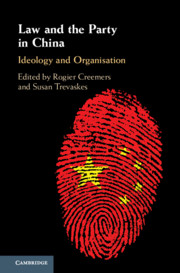Book contents
- Law and the Party in China
- Law and the Party in China
- Copyright page
- Contents
- Contributors
- Abbreviations
- 1 Ideology and Organisation in Chinese Law
- Part I Ideology and the Party in Law
- Part II Ideology and the Party in Law and Organisation
- 6 Seeking Truthful Names
- 7 The ‘Organisational Weapon’ of the Chinese Communist Party
- 8 Disorientation for the New Era
- 9 Technologies of Risk and Discipline in China’s Social Credit System
- Glossary of Chinese Terms
- Index
- References
8 - Disorientation for the New Era
Intraparty Regulations and China’s Changing Party-State Relations
from Part II - Ideology and the Party in Law and Organisation
Published online by Cambridge University Press: 17 December 2020
- Law and the Party in China
- Law and the Party in China
- Copyright page
- Contents
- Contributors
- Abbreviations
- 1 Ideology and Organisation in Chinese Law
- Part I Ideology and the Party in Law
- Part II Ideology and the Party in Law and Organisation
- 6 Seeking Truthful Names
- 7 The ‘Organisational Weapon’ of the Chinese Communist Party
- 8 Disorientation for the New Era
- 9 Technologies of Risk and Discipline in China’s Social Credit System
- Glossary of Chinese Terms
- Index
- References
Summary
Samuli Seppänen examines the issue of Chinese Communist Party rules in the organisation of the Party-state and their relationship to the overall rule-of-law system. His focus is on scholarly arguments that centre around how we are to understand ways in which the Party governs itself and society. A curious twist in rule-of-law ideology has emerged: recent institutional reforms developed under the banner of rule of law have coincided with equally prominent efforts to establish a ‘rational’ system of intraparty regulations within the Party. But why continue to promote law-based governance while seemingly working to undermine that governance through the expansion of a Party disciplinary and supervision regime? These moves have prompted some scholars to take on a ‘commonsense’ approach: to assume, following an instrumentalist tradition, that the ‘political’ and the ‘legal’ are not necessarily in tension with each other since they both sit under a system of ‘rule by regulations’. Seppänen problematises the commonsense narrative by describing an alternative way of understanding ‘the political’ in China.
- Type
- Chapter
- Information
- Law and the Party in ChinaIdeology and Organisation, pp. 214 - 236Publisher: Cambridge University PressPrint publication year: 2021

